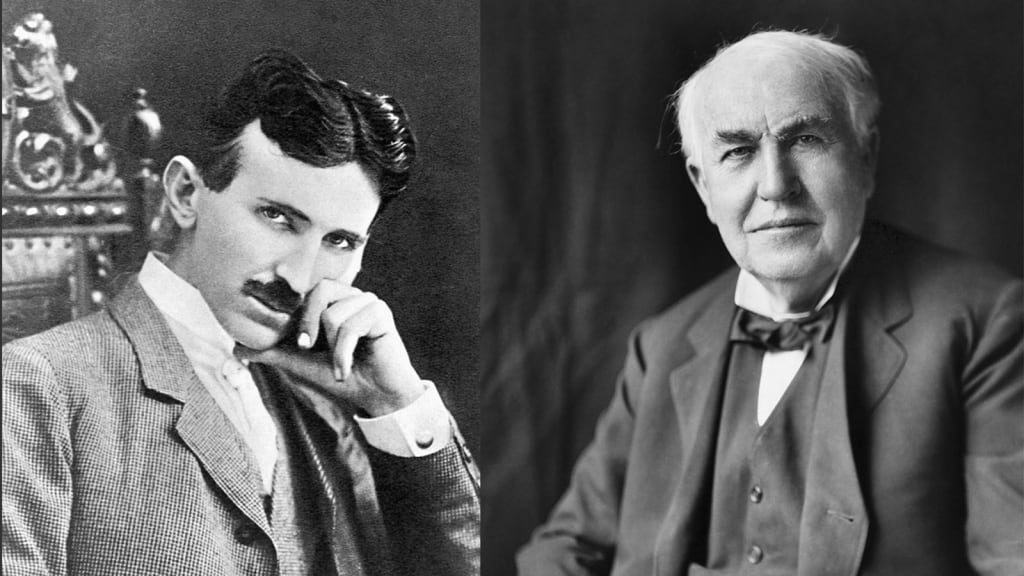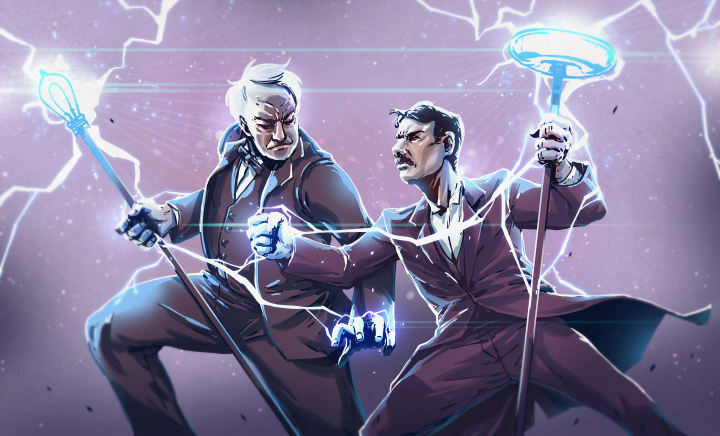Tesla VS Edison
Cultural Impact & Enduring Legacy

Nikola Tesla and Thomas Edison, are two names that have left an indelible mark on the world of electrical innovation. These iconic figures, each with their unique approach, have shaped the very foundations of modern technology. As we delve into the intricacies of their rivalry, we uncover a fascinating tale of contrasting philosophies and the battle for supremacy in the realm of electricity.
Background and Philosophies
Nikola Tesla, born in 1856 in Smiljan, Croatia, exhibited a remarkable aptitude for engineering from an early age. His education in engineering and physics laid the groundwork for his revolutionary ideas. On the other hand, Thomas Edison, a self-taught inventor, had already made a name for himself with innovations like the phonograph and the incandescent light bulb.
Their philosophies on electrical systems couldn't have been more different. Tesla championed alternating current (AC), emphasizing its efficiency in long-distance power transmission. Edison, meanwhile, endorsed direct current (DC) and launched a campaign against AC, fueled by his belief in its safety concerns.
The War of Currents
The late 19th century witnessed the infamous "War of Currents," a period marked by the fierce rivalry between Tesla's AC and Edison's DC. Edison's tactics to discredit AC included staged public demonstrations, even going so far as to use AC to power an electric chair for executions. This battle for dominance captured the attention of the world and became a symbol of the clash between innovation and commercial interests.
Contributions and Inventions
Tesla's contributions were groundbreaking. His invention of the alternating current motor and transformer revolutionized power distribution and laid the groundwork for modern electrical systems. Edison, on the other hand, introduced the phonograph, a device that brought sound to life, and the incandescent light bulb, which illuminated the world.
Comparing their inventions, Tesla's innovations had a profound impact on the foundational infrastructure of electricity, while Edison's creations transformed the way we experience the world around us.
Personalities and Approaches
Tesla's visionary nature was evident in his pursuit of theoretical concepts that pushed the boundaries of possibility. His struggles with financial support, however, limited the full realization of his ideas. Edison, a pragmatist, believed in the "1% inspiration, 99% perspiration" approach, emphasizing experimentation and iterative development.
Legacy and Impact
Tesla's work laid the foundation for modern alternating current systems, enabling efficient long-distance power transmission and wireless communication. Edison's influence is evident in the widespread adoption of direct current systems and his status as an iconic American inventor.
Cultural and Historical Impact
The rivalry between Nikola Tesla and Thomas Edison transcends the world of science and innovation, leaving an indelible mark on culture and history. Their dynamic feud has been a source of inspiration and fascination for generations, permeating various forms of media and literature.
Examination of Popular Media and Literature: The iconic rivalry has found its way into the realms of popular culture, making appearances in literature, films, documentaries, and even artistic works. Books, such as "The Last Days of Night" by Graham Moore, and documentaries like "Tesla: Master of Lightning," have shed light on the complexities of their relationship. On-screen portrayals have captured the intrigue of their clash, shaping the way we perceive their contributions and rivalry.
The symbolism of Innovation and Rivalry: Beyond its entertainment value, the Tesla vs. Edison rivalry serves as a powerful symbol of innovation and rivalry. Their differing approaches underscore the dichotomy between theoretical brilliance and practical persistence. The competition between AC and DC systems mirrors the broader quest for progress and dominance, illustrating the essence of technological advancement.

Conclusion
In summary, the rivalry between Nikola Tesla and Thomas Edison is a captivating saga that goes beyond the realm of electrical innovation. Their contributions to science and technology have had a lasting impact on modern society, shaping the way we live and communicate. Tesla's groundbreaking work with AC systems paved the way for efficient power distribution and wireless communication, while Edison's inventions lit up the world and established him as an emblematic American inventor.
Their feud, characterized by clashing ideologies and the battle of currents, has become an emblem of determination, resilience, and the pursuit of knowledge. As we reflect on their legacies, we acknowledge the enduring influence of both figures on the modern technological landscape.
In the end, the rivalry between Nikola Tesla and Thomas Edison reminds us that innovation is a culmination of diverse approaches and unwavering determination. They stand as pioneers in electrical innovation, sparking a legacy that continues to illuminate our path forward.
About the Creator
Shozab Raza
Shozab Raza: CEO & Founder of Enovadors, a US-based startup driving innovation in tech solutions. Passionate about excellence, redefining industry norms.






Comments
There are no comments for this story
Be the first to respond and start the conversation.